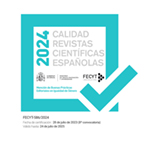How does political leadership influence sub-state electoral behavior? A qualitative approach
Abstract
When the voters decide their vote in Council Elections, do they thinking about the candidate or the party? Or is there any other critical variable that comes into play when deciding the vote at the local level? In this research we perform a qualitative approach to the phenomenon of sub-state voting. Although the evaluation of the candidate is a particularly important factor when deciding the vote in a Council Elections, this is not the only one and is not always the main decision element. The review of the existing theoretical framework regarding electoral behavior and the variables / dimensions that operate in the decision-making process in council elections are very limited. Therefore, we propose a case study by holding focus groups in three municipalities with different historical realities regarding the personal leadership of the candidates.
Downloads
Article download
License

This work is licensed under a Creative Commons Attribution 4.0 International License.
In order to support the global exchange of knowledge, the journal Cuadernos de Gobierno y Administración Pública is allowing unrestricted access to its content as from its publication in this electronic edition, and as such it is an open-access journal. The originals published in this journal are the property of the Complutense University of Madrid and any reproduction thereof in full or in part must cite the source. All content is distributed under a Creative Commons Attribution 4.0 use and distribution licence (CC BY 4.0). This circumstance must be expressly stated in these terms where necessary. You can view the summary and the complete legal text of the licence.







